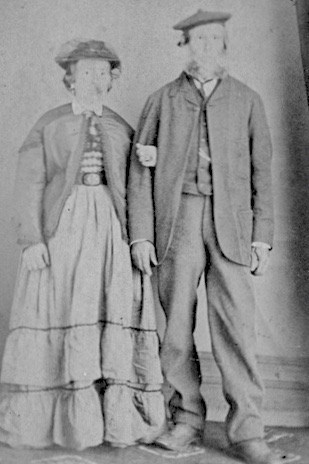Donald Cameron and Christina McLean
Biography
It is speculated that Donald Cameron was born about 1784 in Ockle, Ardnamurchan, Argyll, Scotland. It is not known who Donald’s parents are, however due to Y DNA testing it has been discovered that Donald is related to the family of William Cameron of Morven[5], however the common ancestor remains unknown.
It is believed that he lived there in 1820 were he married Christina McLean, also from Ockle whose parents had moved from the Isle of Mull.
In 1820, when Donald was 36, he married Christina McLean in Strontian, Argyll, and had seven children;
- Dugald, born 1823
- Alexander, born 1824
- Donald, born 1824
- Catherine, born 1827
- Anne, born 1829
- Duncan, born 1832
- John, born 1833
On August 25th 1840 Donald, Christina, and all their children migrated to New Zealand on the boat the Blenheim.
In order to distinguish the various Donald Camerons, the senior Donald Cameron in this family was nicknamed “Weaver” on account of his occupation, and his son Donald Cameron was nick-named “Piper”, because he was a bagpiper.
Donald died 1860 aged 75

Early Life
It appears that Donald was born at the start of the Highland Clearances and as a result, there is only speculation on which family Donald belonged to. There is no direct evidence that Donald was of the chiefly line, rather the contrary. He was not a Scottish landowner, not a well educated man, but a weaver, who preferred to speak Gaelic, even after many years in New Zealand.
Not much is known about Donald and his family prior to when they immigrated to New Zealand other than it is most likely he was a weaver by trade. It is suggested that Weavers made good wages until the advent of the power loom[1]. So by about 1830 it is likely that Donald would have found it hard making a living as a weaver. Further, he would have seen little opportunity for employment for his children so emigration would have had its attractions.Conditions in the new colony could surely have not been worse than they were in the Highlands at that time.
It is said that Donald worked at some time on the Caledonian Canal and saved his wages for the future. He also went down to Paisley to further his weaving skills. Donald apparently observed all he could about weaving methods and also encouraged Paisley weavers to join him in emigrating to New Zealand.
It is also suggested that Donald and his sons worked on the Caledonian Canal to save money for the shift to New Zealand. All this suggests that the move to New Zealand was planned some time ahead. The canal construction commenced in 1803, was officially opened through its entire length in 1822, but it was not until 1847 that all the improvements had finally been made and the canal was considered to be complete to its full depth[2].
Donald’s youngest child Duncan was born in 1834 in Ockle, and it is likely that some time between 1835 and 1838 he moved his family to Ormsaigmore on the southern coast of Ardnamurchan. Ormsaigmore was more accessible to the ferries needed to take them the 100 km to Fort William and the start of the canal.
Although it would have been more convenient to move to Fort William, Donald and his family did not do this. This may have been due to strong family ties in Ardnamurchan, the relative cost of accommodation, or perhaps the wages, food, and living conditions for the canal builder were poor.
In 1840 it is likely that Donald and his family lived in very small stone huts, probably with an earth floor and a thatched roof.
It is stated that Donald’s daughter Catherine with her son Walter returned to Ardnamurchan and had found that the poverty and lack of education had not changed. Most of the relatives back home thought them to be well off and did not believe some of their accounts of sheep, gold, and show were not well believed. Catherine and Walter were happy to return home after this encounter.
All of this would indicate that Donald had no choice but to migrate, as the current conditions were grim. Factory work in the cities was not appealing leaving the only choice as immigration.
Immigration to New Zealand
Donald and his family were recruited as assisted emigrants by the Laird Donald MacDonald of Drimintoran, a highly respected Highlander and a representative of the New Zealand Land Company.
Donald MacDonald was selecting workmen to primarily provide a labour workforce for the construction of the Hutt Road between Kaiwharawhara and Petone. One reason the family was selected was because of their experience in labouring on the construction of the Caledonian Canal.
The emigrants were offered free passage and work in New Zealand and the hope of being able to buy their own land later. MacDonald, who was the leader of the Scots on the Blenheim commented on Donald in the Blenheim passenger list;
“This man and his family have been known to me for many years, he is very industrious.”
Donald and his family would have walked with their possessions from Ormsaigmore, to Strontian at the head of Loch Sunart and from there sailed for Greenock near Glasgow, were they boarded the barque Blenheim and departed for Wellington, New Zealand, on 25th August 1840 leaving at 5pm.
The Blenheim was Captained by John Gray, and the Surgeon was Dr Neil Campbell. The passenger list of 212 comprised of 19 cabin class passengers and 193 assisted emigrants, 63 of them were Camerons. Donald and his family were in two small recesses – six and a half feet by six feet, fairly near the hatches. There quarters were incredibly cramped yet they had to live in them for over 3 month for the total duration of the voyage.
A great source of the voyage is given by Jessie Campbell in her journal[3], see the link in the sources for the text of this journal
Life in New Zealand
Donald Cameron and his family had taken up land in the Wairarapa by 1846, at Pahaoa on the Wairarapa coast, which was initially leased from local Maori. In 1854, following the Government purchase of land in the district the leaseholders were able to buy the land. Donald Cameron purchased the homestead block, while the licence for the remainder of the Pahaoa property was in the names of his five sons. By 1858 Donald had also bought land at Parewanui in Rangitiki to secure a property for his daughter Annie and her husband James McDonell. [4]
Death
Donald Cameron died on 12 February 1860 aged 75, apparently as a result of a logging accident at Waiwhetu.[4]
Sources
[1] The Kaiwarra Camerons; The first fifty years in New Zealand: 1840-1890; By M. J. Ulyatt
[2] http://www.seagulltrust.org.uk/canal-history
[3] Jessie Campbells Diary – https://blenheim175.wordpress.com/2015/05/19/jessie-campbells-journal/
[4]https://blenheim175.wordpress.com/2015/03/23/donald-cameron-and-christian-mclean/
